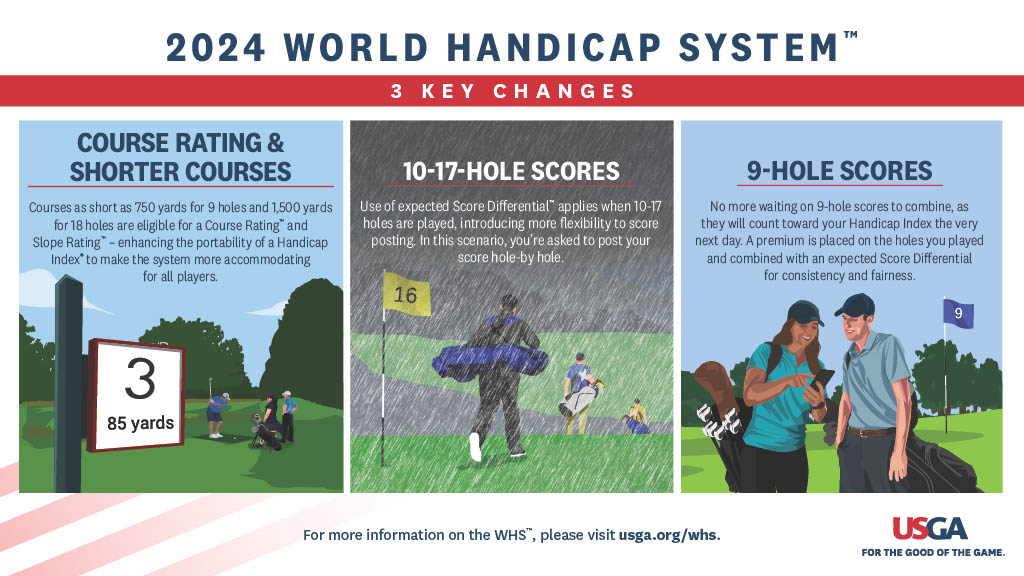
Welcome to the World Handicap System™ (WHS™)! Since January 1, 2020, handicaps across the world have been calculated using a uniform set of policies and procedures called the World Handicap System. As a part of the ongoing efforts to ensure the WHS evolves with the modern game, below are three key changes scheduled to go into effect in the United States in 2024. When you join the SDGA you will receive a Handicap Index after posting just 54 holes of golf. With a Handicap Index you can play on an even footing with any other player with a Handicap Index from any set of tees. Click on the graphic below to learn more about the changes for 2024!
-
Daily Handicap Revisions
Your Handicap Index is updated every day so please post scores immediately after completing your round.
-
Handicap Calculation
New golfers can establish a handicap with only three rounds, and your handicap is computed using the best eight of your last 20 score differentials.
-
Playing Conditions Calculation
If playing conditions cause scores to be abnormally high or low on a given day, the PCC will adjust all score posted that day. Members should post their score immediately after playing a round of golf.
-
Exceptional Score Reduction
For any score (not just a "tournament" score") that is more than SEVEN strokes better than their index, all scores in the player's scoring profile will be adjusted by 1 or 2 strokes. With daily revisions, any exceptional score will now be immediately reflected in the next day's calculation.
-
Caps
The amount a handicap-index can increase in any given 12 month period is limited to FIVE strokes.
-
Course Handicap
The new way that Course Handicaps are determined will allow players to compete from different sets of tees more easily and fairly.
-
Net Double Bogey
When you post a score, the maximum score for any hole will be Net Double Bogey (Par + 2 + any handicap strokes you receive (replaces Equitable Stroke Control). When you post your scores hole-by-hole, the new GHIN system will automatically make any adjustments.
Daily Handicap Revisions
With the World Handicap System, the Handicap Index is computed and updated daily. This makes playing a lot more fun and fair as handicaps will always include the latest scores. For new players, a Handicap Index will be computed the day after they post the minimum 54 holes of play.
Daily revisions (and the new Playing Conditions Calculation) make it imperative that players remember to post their scores before midnight on the date played.
Handicap Calculation
Getting a Handicap Index is easy and very affordable even if you’re a newer golfer. When you have a handicap you can:
- Track your progress over time.
- Play against other golfers of different ability.
- Easily figure out your course handicap as you play different courses and from any tee box.
Once a full playing profile of 20 scores is reached, a player’s Handicap Index will be calculated using the lowest EIGHT of the most recent 20 scores.
Playing Conditions Calculation
The Course Rating System is the cornerstone of handicapping and measures the difficulty of a golf course under normal conditions. However, a good score on a normal day may turn mediocre when the weather is challenging. In addition to the impact of Mother Nature, tough course setups such as unusual rough height or hole locations can have a significant impact. Courses can also play differently with the seasons due to soft or hard / firm conditions.
The World Handicap System responds to these issues with a new, exciting feature called the Playing Conditions Calculation – or PCC. The PCC will be triggered when abnormal playing conditions cause scores to be unusually high or low on a given day.
Conservative in nature, the PCC will be an automated statistical procedure within the WHS and result in a special notation in the player’s scoring record when applied. There must be at least eight scores submitted on the day of play for the adjustment to be made. If a course is having too many days that are being adjusted by PCC, that would indicate that the course may need to be re-rated.
It will be imperative that players post scores immediately after play so the PCC will be applied when appropriate.
Exceptional Score Reduction
Exceptional Score Reduction (ESR) is a procedure for handling certain scores which may indicate the player’s true ability. The ESR rule considers all scores and not just tournament scores. If a player posts a score that produces a score differential 7.0 strokes or better than their Handicap Index at the time the score was submitted, an automatic adjustment is made. The existence of the ESR applies an adjustment to up to 19 of the player’s previous scores retroactively, which in turn, automatically adjusts the player’s Handicap Index. When a player has multiple scores with an ESR adjustment, the effect is cumulative. Along with Daily Revisions, ESR will have the effect of immediately lowering a player’s Handicap Index.
Course and Playing Handicap
Your Handicap Index will compute to a Course Handicap at any course that you play. You can find this out before you play on the handicap computer or the GHIN mobile app. It will vary based on the slope rating of the course so your Course Handicap will be higher at more difficult courses and lower at easier courses. Your Course Handicap will also change depending on which tees you are playing from.
Your Playing Handicap is your Course Handicap adjusted for any handicap allowances or Terms of the Competition. For some events, the Terms may state that players only receive a certain percentage (80%, 85%, etc.) of their Course Handicap.
Soft and Hard Caps
The WHS limits the upward movement of a Handicap Index by applying a Soft Cap and a Hard Cap based on the player’s Low Handicap Index from the previous 12 months.
The Soft Cap will suppress upward movement by 50% after a 3.0 increase over a player’s 12-month Low Handicap Index has been reached.
The Hard Cap will restrict upward movement to 5.0 over the Low Handicap Index from the past 12 months.
Net Double Bogey
The WHS has a safeguard that reduces the effect on a bad hole or two on your total score called Net Double Bogey. For every player there is a maximum score that can be used when posting your scores. Net Double Bogey will be used when a player’s actual score or Most Likely Score (* see notation below) exceeds a maximum number derived using the following formula:
Net Double Bogey = Par + 2 + / – Handicap strokes received or given on a hole
Note that the minus symbol above and “strokes given” would apply to those rare folks with plus handicaps. The rest of us need to think of this new adjustment simply as “Double Bogey Plus”, because it’s easier to leave “Net” out of it! This terminology also is consistent with another adjustment already in use whenever we don’t play a hole or play a hole other than under the Rules of Golf, called “Par Plus”.
So, here’s the best way to teach yourself this new Rule:
Double Bogey Plus = Par + 2 + any handicap strokes you’re entitled to on the hole
Your Course Handicap determines how many handicap strokes you receive and each hole has a Stroke Allocation number so you know the holes where you receive strokes. A player with a handicap of 9 receives one handicap stroke on holes with a stroke allocation of 1-9.
So if you are a 9 handicap and you make a 10 on a par five with a stroke allocation value of 7, the score you would use when you post your score would be as follows:
5 (par) + 2 + 1 (handicap stroke) = 8
The best way to make sure you are correctly applying Net Double Bogey is to post your score hole-by-hole on the GHIN app or clubhouse computer. The GHIN software will automatically adjust any holes that are affected by Net Double Bogey.
* Most Likely Score is used whenever you start but don’t finish a hole, no matter the reason. It is the number of strokes you’ve already taken, plus the number of strokes it would take you to finish the hole most of the time, based on your best judgment about your own game.




